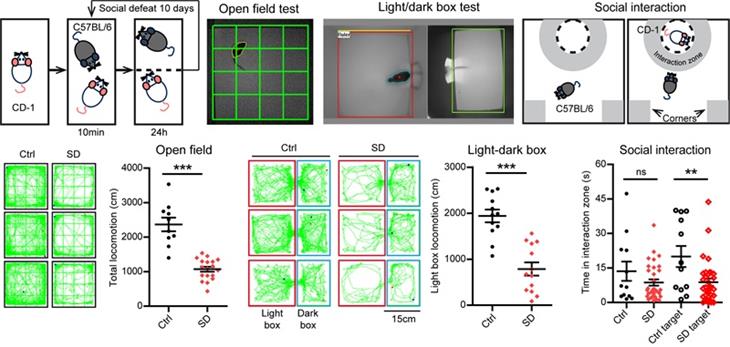Yuting Ma’s group discovered an unexpected link between mental stress and immune suppression during cancer therapies
Source:Yuting Ma
2019-09-12
Prof Yuting MA‘s group from Suzhou Institute of Systems Medicine, Chinese Academy of Medical Sciences published a research article in Nature Medicine entitled “Stress–glucocorticoid–TSC22D3 axis compromises therapy-induced antitumor immunity” on September 9, 2019. They dissected psychological stress-induced crosstalk between neuroendocrine system and immune system, and demonstrated how it can influence the therapeutic outcomes of chemotherapy and immunotherapy. From a novel perspective of “mental stress-mediated immune regulation”, their work explored the impact of mental stress-triggered disorders on the secretion of stress hormones and neuron transmitters and anti-tumor immune responses. This study helps to develop new theories and provide potential therapeutic targets and strategies for cancer management.
It has long been suspected that mental stress may link to the incidence, progression and therapeutic failure of cancer. Clinical observations and epidemiologic studies suggested that prevalence of mental disorders was often under-estimated in cancer patients. Self-reported psychological distress scores are epidemiologically linked to cancer-related mortality. However, meta-analyses on this topic often give conflicting conclusions. The impact of psychosocial stress on the outcome of cancer treatment and the mechanisms underneath remain be carefully explored. Optimal activation of anti-tumor immunity is essential for the therapeutic control of neoplasia. A vital but unsolved question is the impact of mental stress on anti-tumor immunity during cancer therapies and the underlying mechanisms.
Ma’s group applied social defeat and acute restraint models to induce mental stress in mice, and utilized a series of behavioral tests, including open field, light-dark box, splash test and social avoidance to evaluate the anxiety- and depression-like phenotype. In both murine transplantable cancer and carcinogen-induced primary carcinoma models, mental stress induced by repeated social defeat (SD) procedures promoted tumor progression and compromised the efficacy of chemotherapy and immunotherapy. SD caused both local and systemic immunosuppression, as manifested by reprogramming the transcriptome of tumor-infltrating DC, suppressing Th1/Tc1 responses and a general reduction of multiple cytokines and chemokines in the peripheral blood. Immune cells do express receptors for stress hormones and neuron transmitters, which forms the molecular basis of neuronendocrine factor-mediated immune regulation. They also discovered that stress-induced glucocorticoid surge and Tsc22d3 upregulation can block type I IFN responses and antigen presentation of DC, therefore subverting therapy-induced anticancer immunosurveillance. Plasma cortisol level was significantly elevated in cancer patients, compared with healthy volunteers. Also, positive correlations were found between the scores of profile of mood states (POMS) and plasma cortisol levels, as well as between plasma cortisol levels and TSC22D3 expression in PBMC, of individual patients. For patients bearing digestive cancers, such as gastric and colorectal carcinomas, high expression of TSC22D3 correlated with unfavorable OS. In accordance with the fact that TSC22D3 represses type I IFN responses in mice, low expression of CXCL9 and CCL5 correlated with unfavorable OS in lung cancer patients with smoking history, as well as in colorectal and gastric cancer patients.

This study creatively combined mental-stress inducing strategies, classic behavioral tests and the model of tumorigenesis, tumor progression and cancer therapies, which paved the way for the mechanistic exploration of neuronendocrine-immune networks in the setting of neoplastic diseases. These findings also urge caution in the stress-management and applications of synthetic glucocorticoids in immune-dependent cancer therapies in the clinical practice.
Links: https://www.nature.com/articles/s41591-019-0566-4
It has long been suspected that mental stress may link to the incidence, progression and therapeutic failure of cancer. Clinical observations and epidemiologic studies suggested that prevalence of mental disorders was often under-estimated in cancer patients. Self-reported psychological distress scores are epidemiologically linked to cancer-related mortality. However, meta-analyses on this topic often give conflicting conclusions. The impact of psychosocial stress on the outcome of cancer treatment and the mechanisms underneath remain be carefully explored. Optimal activation of anti-tumor immunity is essential for the therapeutic control of neoplasia. A vital but unsolved question is the impact of mental stress on anti-tumor immunity during cancer therapies and the underlying mechanisms.
Ma’s group applied social defeat and acute restraint models to induce mental stress in mice, and utilized a series of behavioral tests, including open field, light-dark box, splash test and social avoidance to evaluate the anxiety- and depression-like phenotype. In both murine transplantable cancer and carcinogen-induced primary carcinoma models, mental stress induced by repeated social defeat (SD) procedures promoted tumor progression and compromised the efficacy of chemotherapy and immunotherapy. SD caused both local and systemic immunosuppression, as manifested by reprogramming the transcriptome of tumor-infltrating DC, suppressing Th1/Tc1 responses and a general reduction of multiple cytokines and chemokines in the peripheral blood. Immune cells do express receptors for stress hormones and neuron transmitters, which forms the molecular basis of neuronendocrine factor-mediated immune regulation. They also discovered that stress-induced glucocorticoid surge and Tsc22d3 upregulation can block type I IFN responses and antigen presentation of DC, therefore subverting therapy-induced anticancer immunosurveillance. Plasma cortisol level was significantly elevated in cancer patients, compared with healthy volunteers. Also, positive correlations were found between the scores of profile of mood states (POMS) and plasma cortisol levels, as well as between plasma cortisol levels and TSC22D3 expression in PBMC, of individual patients. For patients bearing digestive cancers, such as gastric and colorectal carcinomas, high expression of TSC22D3 correlated with unfavorable OS. In accordance with the fact that TSC22D3 represses type I IFN responses in mice, low expression of CXCL9 and CCL5 correlated with unfavorable OS in lung cancer patients with smoking history, as well as in colorectal and gastric cancer patients.

This study creatively combined mental-stress inducing strategies, classic behavioral tests and the model of tumorigenesis, tumor progression and cancer therapies, which paved the way for the mechanistic exploration of neuronendocrine-immune networks in the setting of neoplastic diseases. These findings also urge caution in the stress-management and applications of synthetic glucocorticoids in immune-dependent cancer therapies in the clinical practice.
Links: https://www.nature.com/articles/s41591-019-0566-4


